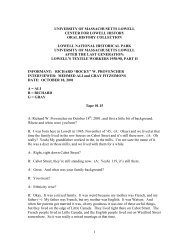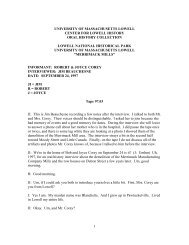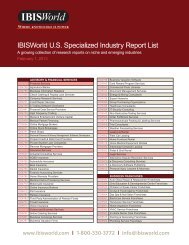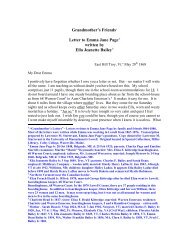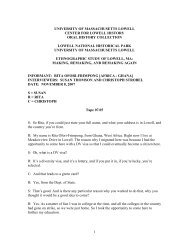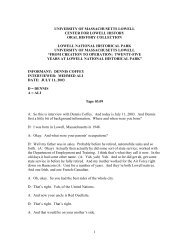LOOM AND SPINDLE OR Life Among the Early Mill Girls WITH A ...
LOOM AND SPINDLE OR Life Among the Early Mill Girls WITH A ...
LOOM AND SPINDLE OR Life Among the Early Mill Girls WITH A ...
You also want an ePaper? Increase the reach of your titles
YUMPU automatically turns print PDFs into web optimized ePapers that Google loves.
<strong>the</strong>m–for children do not see <strong>the</strong> pa<strong>the</strong>tic side of human life–and imitated <strong>the</strong>ir limp<br />
carriage and inelastic gait. I can see <strong>the</strong>m now, even after sixty years, just as <strong>the</strong>y<br />
looked,–depressed, modest, mincing, hardly daring to look one in <strong>the</strong> face, so shy and<br />
sylvan had been <strong>the</strong>ir lives. But after <strong>the</strong> first pay-day came, and <strong>the</strong>y felt <strong>the</strong> jingle of<br />
silver in <strong>the</strong>ir pockets, and had begun to feel its mercurial influence, <strong>the</strong>ir bowed heads<br />
were lifted, <strong>the</strong>ir necks seemed braced with steel, <strong>the</strong>y looked you in <strong>the</strong> face, sang<br />
bli<strong>the</strong>ly among <strong>the</strong>ir looms or frames, and walked with elastic step to and from <strong>the</strong>ir<br />
work. And when Sunday came, homespun was no longer <strong>the</strong>ir only wear; and how<br />
sedately gay in <strong>the</strong>ir new attire <strong>the</strong>y walked to church, and how proudly <strong>the</strong>y dropped<br />
<strong>the</strong>ir silver fourpences into <strong>the</strong> contribution-box! It seemed as if a great hope impelled<br />
<strong>the</strong>m,–<strong>the</strong> harbinger of <strong>the</strong> new era that was about to dawn for <strong>the</strong>m and for all womenkind.<br />
In passing, let me not forget to pay a tribute, also, to those noble single and widowed<br />
women, who are "set solitary in families," but whose presence cements <strong>the</strong> domestic<br />
fabric, and whose influence is unseen and oftentimes unappreciated, until <strong>the</strong>y are taken<br />
away and <strong>the</strong> integral part of <strong>the</strong> old home-life begins to crumble.<br />
Except in rare instances, <strong>the</strong> rights of <strong>the</strong> early mill-girls were secure. They were subject<br />
to no extortion, if <strong>the</strong>y did extra work <strong>the</strong>y were always paid in full, and <strong>the</strong>ir own<br />
account of labor done by <strong>the</strong> piece was always accepted. They kept <strong>the</strong> figures, and were<br />
paid accordingly. This was notably <strong>the</strong> case with <strong>the</strong> weavers and drawing-in girls.<br />
Though <strong>the</strong> hours of labor were long, <strong>the</strong>y were not over-worked; <strong>the</strong>y were obliged to<br />
tend no more looms and frames than <strong>the</strong>y could easily take care of, and <strong>the</strong>y had plenty of<br />
time to sit and rest. I have known a girl to sit idle twenty or thirty minutes at a time. They<br />
were not driven, and <strong>the</strong>ir work-a-day life was made easy. They were treated with<br />
consideration by <strong>the</strong>ir employers, and <strong>the</strong>re was a feeling of respectful equality between<br />
<strong>the</strong>m. The most favored of <strong>the</strong> girls were sometimes invited to <strong>the</strong> houses of <strong>the</strong><br />
dignitaries of <strong>the</strong> mills, showing that <strong>the</strong> line of social division was not rigidly<br />
maintained.<br />
Their life in <strong>the</strong> factory was made pleasant to <strong>the</strong>m. In those days <strong>the</strong>re was no need of<br />
advocating <strong>the</strong> doctrine of <strong>the</strong> proper relation between employer and employed. Help was<br />
too valuable to be ill-treated. If <strong>the</strong>se early agents, or overseers, had been disposed to<br />
exercise undue authority, or to establish unjust or arbitrary laws, <strong>the</strong> high character of <strong>the</strong><br />
operatives, and <strong>the</strong> fact that women employees were scarce would have prevented it. A<br />
certain agent of one of <strong>the</strong> first corporations in Lowell (an old sea-captain) said to one of<br />
his boarding-house keepers, "I should like to rule my help as I used to rule my sailors, but<br />
so many of <strong>the</strong>m are women I do not dare to do it."<br />
The knowledge of <strong>the</strong> antecedents of <strong>the</strong>se operatives was <strong>the</strong> safeguard of <strong>the</strong>ir liberties.<br />
The majority of <strong>the</strong>m were as well born as <strong>the</strong>ir "overlookers," if not better; and <strong>the</strong>y<br />
were also far better educated.<br />
The agents and overseers were usually married men, with families of growing sons and<br />
daughters. They were members, and sometimes deacons, of <strong>the</strong> church, and teachers in



